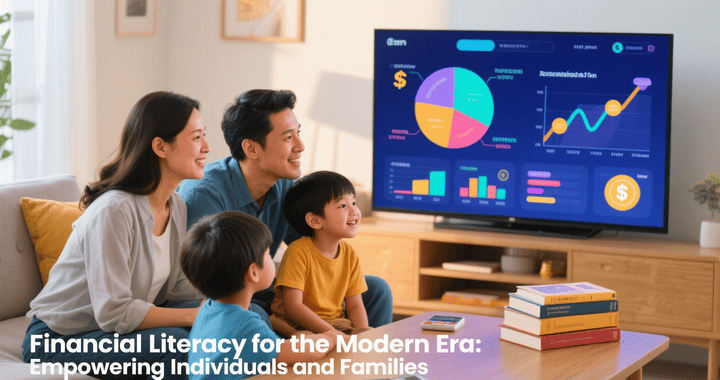Financial Literacy for the Modern Era: Empowering Individuals and Families

In today's complex financial landscape, financial literacy has become an essential skill for individuals and families seeking to achieve financial well-being. Understanding personal finance is no longer a luxury; it is a necessity that empowers people to make informed decisions, manage their money effectively, and secure their financial futures. This article explores the critical role of financial literacy, the challenges faced in its promotion, and strategies for enhancing financial education and inclusion.
The Importance of Financial Literacy
Financial literacy refers to the ability to understand and effectively use various financial skills, including personal finance management, budgeting, investing, and understanding credit. Here are some key reasons why financial literacy is vital in the modern era:
Informed Financial Decision-Making: Financial literacy equips individuals with the knowledge necessary to make informed choices about spending, saving, and investing. This understanding helps them avoid pitfalls such as high-interest debt and poor investment decisions.
Enhanced Money Management: With financial literacy, individuals can create and stick to budgets, manage expenses, and save for future goals. Improved money management leads to greater financial stability and security.
Preparation for Financial Emergencies: Understanding financial concepts allows individuals to build emergency funds and plan for unexpected expenses, reducing the stress associated with financial crises.
Empowerment and Independence: Financial literacy empowers individuals to take control of their financial situations, promoting independence and confidence in managing their finances.
Promoting Financial Inclusion: Educating marginalized communities about financial concepts can help bridge the gap in financial access and resources, fostering greater economic equality.
Challenges to Financial Literacy
Despite the clear benefits of financial literacy, many individuals and families face significant challenges in acquiring this essential knowledge:
Lack of Access to Education: Many schools do not include personal finance education in their curricula, leaving students ill-prepared for real-world financial decisions. Adults may also lack access to financial education resources.
Complex Financial Products: The modern financial landscape is filled with complex products and services, making it difficult for individuals to understand their options. This complexity can lead to confusion and poor decision-making.
Cultural Barriers: Cultural attitudes towards money and financial practices can influence an individual's willingness to engage with financial education. In some cultures, discussing money is taboo, hindering open conversations about financial literacy.
Digital Divide: With the increasing reliance on technology for financial transactions and management, those without access to the internet or digital tools may struggle to engage with financial education resources.
Strategies for Promoting Financial Education
To enhance financial literacy and empower individuals and families, several strategies can be implemented:
Integrating Financial Education into School Curricula: Schools should incorporate personal finance education into their programs, teaching students essential skills such as budgeting, saving, and investing from a young age. This foundation can lead to better financial habits in adulthood.
Community Workshops and Seminars: Local organizations, libraries, and community centers can host workshops and seminars focused on financial literacy. These events can provide valuable information and resources to individuals seeking to improve their financial knowledge.
Online Resources and Courses: The internet offers a wealth of resources for financial education, including online courses, webinars, and articles. Promoting these resources can help individuals learn at their own pace and convenience.
Utilizing Technology: Financial apps and tools can simplify money management and provide users with insights into their spending habits. Encouraging the use of these tools can enhance financial literacy and promote better money management.
Mentorship Programs: Pairing individuals with financial mentors can provide personalized guidance and support. Mentors can share their experiences and knowledge, helping mentees navigate their financial journeys.
The Role of Financial Institutions
Financial institutions also play a crucial role in promoting financial literacy and inclusion:
Offering Educational Resources: Banks and credit unions can provide educational materials, workshops, and online resources to help customers understand financial products and services.
Developing Inclusive Products: Financial institutions should create products that cater to underserved communities, ensuring that everyone has access to the financial tools they need.
Community Engagement: Collaborating with local organizations to promote financial literacy initiatives can help reach a broader audience and foster a culture of financial education.
Conclusion
In the modern era, financial literacy is essential for empowering individuals and families to navigate the complexities of personal finance. By understanding financial concepts, individuals can make informed decisions, manage their money effectively, and work towards financial well-being. While challenges to financial literacy exist, implementing strategies to promote education and inclusion can help bridge the gap. By investing in financial literacy, we can create a more financially informed society, leading to greater economic stability and prosperity for all.
